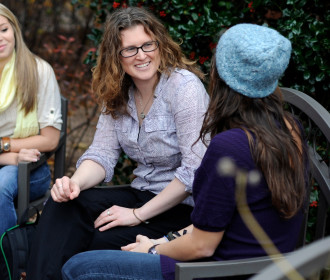Asheville resident and counselor Winston Janusz developed numerous physical issues after enduring stress that “just kept building and building and building. … It was a really stressful time. I was in graduate school — all this stuff, plus low on sleep because of having young kids. I’ve had chronic low back pain, tension in the shoulders, tightness … problems with digestion, stomach discomfort.”
The experience brought the material he was studying in his courses home in a new way. “Though I already had training as a therapist, it’s kind of a different ballgame when you’re experiencing that personally.” Along with the physical symptoms, Janusz also experienced panic attacks.
Janusz says he was able to recover and wants to share his message with others. “I was able to use my education and my resources [as well as] practicing mindfulness and exercise and seeing a good therapist,” he notes. “Not that I never feel anxious; I think that’s part of being human, but it’s nothing like it was. I have it under control.”
Janusz’s experience highlights the importance of caring for one’s mental health, a message promoted by Mental Health Month in May, which stresses the need to “make use of the tools and resources that benefit minds and bodies together,” according to sponsor Mental Health America.
Mental health problems don’t have to be traumatic or severe to cause a decline in health, explains Kia Asberg, professor of psychology at Western Carolina University. Even less severe levels of depression or stress seem to tax the body. “We know through research that disorders exist on a continuum, so absolutely there can be some compromises both in physical and mental health — whether those rise to the level of a diagnosis or not.”
More intense struggles can produce more noticeable effects. Jackson County resident Dee Jane Wilder says she faced compounding personal events a couple of years ago that not only affected her mental health but also her physical health. “I ended up with high blood pressure. I ended up with weight gain. I ended up sedentary, which led to more health problems and insomnia. I literally ended up with a tic in my right shoulder,” says Wilder. “I’m 56 years old, so for emotional trauma to impact my body like that was something that I never expected.”

Become Aware
One of the challenges with medical treatment, says Asberg, is that many doctors and patients overlook mental health, focusing instead on physical complaints. “If somebody is lucky enough or fortunate enough to have access to primary care, they may not present with the mental health issue as the driver of the referral or the reason for seeking tests,” says Asberg. “A majority of folks are presented at primary care … with physical or somatic complaints. I think it is important to get education out there both to the public as a whole and to primary care providers — the importance of screening for mental health issues.”
As part of Mental Health Month, local mental health agencies are sponsoring events designed to spread the word about the importance of addressing mental health.
Ashley Starnes has been involved in helping to coordinate one of these events as the administrative and development assistant at the Black Mountain Counseling Center, a nonprofit that serves the lower-income population of east Buncombe County. The center has partnered with the Swannanoa Valley Fine Arts League to present an art exhibit called “Ten Days in May,” which is designed to raise consciousness and reduce the stigma of mental health issues. The exhibit runs Tuesday, May 15, to Thursday, May 25, at the The Red House Studios & Gallery in Black Mountain.
The National Alliance on Mental Illness Western Carolina and All Souls Counseling Center of Asheville are sponsoring a mental wellness walk on Saturday, May 19, at Carrier Park in Asheville. According to the NAMI website, the walk is designed “to raise awareness of the importance of mental wellness and community resources that exist for people with mental health issues.”
Stressed out
Physical ailments often result from the body’s reaction to stress, says Keith Cox, clinical psychology professor at UNC Asheville. “There’s not this kind of nice one-to-one relationship between one specific mental health disorder and one specific [physical] symptom of the disorder,” says Cox, “but it’s more that a number of mental health disorders stress, overtax and dysregulate bodily processes that are not meant to be always on.”

“Most mental health problems by definition come with elevated levels of stress or give stress, and that can result in poor health,” Asberg explains. “My area of research and others obviously have shown that chronic activation of stress response systems can then in turn put a strain on the immune system, can impact sleep, appetite, other basic functions that we need for our bodies to recover. Obviously, it can also increase the risk for specific health problems … diabetes, heart disease, cognitive impairments, autoimmune disorders … joint pain, back pain, gastrointestinal problems, fatigue [and] psychomotor changes.”
Mary Ammerman, vice president of the Institute for Applied Neuroscience in Asheville, which utilizes neurofeedback and other brain health modalities, says that “chronic stress just depletes your resources. It’s just hard on your body because our nervous systems were kind of designed to respond to a temporary stressor that we can run away from or fight off and then go back to a resting state. But when we’re chronically on high alert, it just takes its toll on your organs, your immune system, I mean everything. So really it’s taxing to your autonomic nervous system.”
Janusz says an important part of physical treatment is seeking help to treat the mind. “It’s important to care for our mental health. You can do things for your mental health, just like you do things for your physical health,” he says. “We go to our doctor once a year for a physical checkup, if we have insurance and all that — not because we are sick, but to make sure everything’s working well. I think, in this day and age, we are in such a bad place in terms of mental health, suicide and school shootings and everything. I really feel that people need to hear that our mental health is worth checking up on, too.”

Asberg gives a similar recommendation, encouraging those struggling with stress or other mental health issues “to raise those concerns to their practitioner, whoever that may be … or at least get a checkup just like we would for physical health.”
Ammerman makes the same case: “I think people have accepted the fact that if you want to be physically healthy, there are things you have to do. You have to watch what you eat. You have to exercise. … We at least know that being physically healthy requires some effort. Being mentally and emotionally healthy requires some effort, too.”

Cox says it’s difficult to research the bodily impact of mental health treatment because “the causal arrows of physical health to mental health, they go both ways,” which makes it challenging for researchers to determine the exact direction of the change. But he notes that his research team is gathering some measurements, “and we regularly show that effective post-traumatic stress disorder treatments lead to reductions … of chronic inflammation in the body.”
Attending a recent conference, Cox says, he encountered colleagues who were uncovering similar findings. In one study being prepared for publication, “they take blood samples before the mental health treatment to see measures of chronic inflammation, and then they take measures after the treatment, and those show reduction,” he says.
New research shows “there’s lots of reasons to try to treat mental health issues early,” Cox explains. “One of them for sure is reducing the risk [to your body].”
Real recovery
Janusz offers a message of hope to others: “I feel confident that because I’ve gotten through it, other people can get through it. It was rough. Depression goes along with that too; you get depressed because you are anxious and feel so out of control and like there is no escape from it. … It’s a horrible form of suffering. There are ways out of it, there are people who have overcome it, and I am one of them.”
But not everyone has access to care, says Asberg, and those who don’t receive needed mental health treatment are especially susceptible to physical problems. “The association between mental and physical health problems is particularly strong among vulnerable, underserved communities or other marginalized groups,” she points out, especially those who lack a gateway into mental health care because they are “living in poverty or face other forms of discrimination or barriers to treatments.”
Vaya Health, a public managed care organization operating in Western North Carolina, can connect those in need of mental health care to resources through its 24-hour service line.
Wilder was able to access services through Meridian Behavioral Health Services, a nonprofit serving Cherokee, Haywood, Jackson, Macon and Transylvania counties. Meridian provides mental health services to individuals “who wouldn’t have access to services otherwise,” explains Katie Goetz, adult clinical director. Wilder says that through Meridian she was able to access a physician, psychiatrist and counselor. Peer support and a variety of tools and techniques also helped ease her “personal toxic stress.” Since then, she notes, she has authored three books and works as an editor, inspirational coach and peer-support provider.
Wilder credits her experience at Meridian with her recovery: “The most important things that really helped me over the last year were the social support of being able to be open and being able to talk about it and the trauma resiliency classes and positive psychology classes.”
MORE INFO
WHAT: Ten Days in May art exhibit
WHERE: The Red House Studios & Gallery, 310 W. State St., Black Mountain
WHEN: Tuesday-Friday, May 15-25, 828-669-0351
WHAT: Mental Wellness Walk
WHERE: Carrier Park, 220 Amboy Road, Asheville
WHEN: Saturday, May 19, 9 a.m.-1 p.m., 828-505-7353
Mental Health America
mentalhealthamerica.net
Dee Jane Wilder
deejanewilder.com
Winston Janusz
winstonjanusz.com
Black Mountain Counseling Center
blackmountaincounseling.org
National Alliance on Mental Illness Western Carolina
namiwnc.org
Vaya Health
vayahealth.com
800-849-6127
Meridian Behavioral Health Services
meridianbhs.org




Most mental health and physical activity research describe unidirectional causes of physical activity on mental health, and as a result, a strong evidence base is being established for the effectiveness of physical activity as a treatment for mental health issues.
Physical workouts are meant to bring about a good circulation of blood in the vessels provisioning the brain. When such a circulation is achieved, it becomes easy for brain cells to efficiently function as required.
On the other hand, mental workouts are meant to keep the brain fit and alert. It has nothing to do with brain cells being provisioned or not. It is all about keeping the cognitive abilities of the brain at their best.
Clearly, it is necessary that both mental and physical brain workouts are kept at equilibrium.
Also, recently I read an article https://www.smartpillwiki.com/super-brain-yoga-exercises-gym-books-reviews-and-research/ about yoga. Check it out for more information about a universal way to keep healthy body and mind.